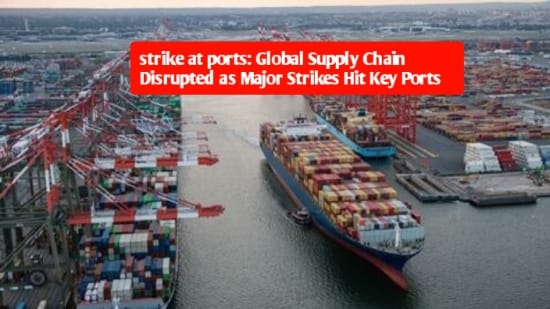strike at ports: Global Supply Chain Disrupted as Major Strikes Hit Key Ports, The strikes have affected the movement of goods,
strike at ports
In an unprecedented disruption to global supply chains, key ports around the world have been severely impacted by ongoing strikes as workers demand better wages and working conditions. The strikes, which began at major ports in Europe and North America, have now spread to several ports in Asia, leading to significant delays in international trade.
Impact on Trade
The strikes have affected the movement of goods, causing delays in the shipping of essential commodities like food, medical supplies, and electronics. With major global shipping hubs such as the Port of Rotterdam in the Netherlands, the Port of Los Angeles in the U.S., and the Port of Shanghai in China experiencing slowdowns or temporary closures, businesses are scrambling to find alternative routes to minimize disruption. According to industry analysts, the slowdown could result in a 10-15% drop in global trade for the quarter, further exacerbating existing supply chain challenges due to geopolitical tensions and the pandemic.
Worker Demands
Port workers are seeking increased wages, better working conditions, and job security, citing inflation and rising costs of living as reasons for their demands. Unions representing these workers have argued that despite ports handling record levels of goods during the pandemic, workers have not seen fair compensation for their increased labor.
In Europe, dockworkers are negotiating for a 15% wage hike to combat inflation, while U.S. unions are pushing for better health benefits and a reduction in work hours. Meanwhile, port workers in China are demanding more automation-related protections as ports look to increase efficiency through technological upgrades, which they fear could lead to job losses.
Government Response
Governments are beginning to step in, with some, like the U.S. and China, threatening to invoke emergency powers to keep critical ports operational. In the European Union, discussions are underway to mediate talks between port operators and unions to prevent further escalation. However, the complexity of the negotiations and the involvement of multiple nations with differing labor laws have slowed progress.
Business Reactions
Businesses that rely heavily on international shipping, including major retailers and manufacturers, are facing severe challenges. Many have reported stock shortages, and some companies, such as major automobile manufacturers, have had to temporarily shut down production due to a lack of critical components. The global tech industry, which depends on the timely shipment of semiconductors and electronics from Asia, is bracing for more severe delays, potentially impacting product launches and services.
To counter the delays, some companies are resorting to air freight, which is far more expensive than sea transport. Others are rerouting shipments to smaller, unaffected ports, though these ports often lack the infrastructure to handle the additional traffic, leading to further delays.
Global Economic Outlook
Economists are predicting that the strikes could have long-term effects on the global economy if they persist. With inflation already high in many parts of the world, the disruption in the supply chain could push prices higher, especially for imported goods. This may also impact energy markets, as the delayed shipment of oil and gas could lead to short-term shortages in some regions, increasing energy costs.
As of now, there is no clear resolution in sight, with union leaders and port operators remaining at a stalemate. If the strikes continue into the coming months, the effects could snowball, affecting industries across the globe and potentially causing a global recession.
Conclusion
The ongoing strikes at key global ports highlight the fragility of modern supply chains and the deepening tension between labor and management. While governments and businesses work to find solutions, consumers around the world may feel the impact of these strikes in the form of higher prices and limited availability of goods in the coming weeks and months. The global economy now waits to see whether negotiations will resolve the issue or lead to even further disruptions.
How did you like the information given in our article today, please tell us in the comment section and for more such posts, follow our page The News House, thank you
